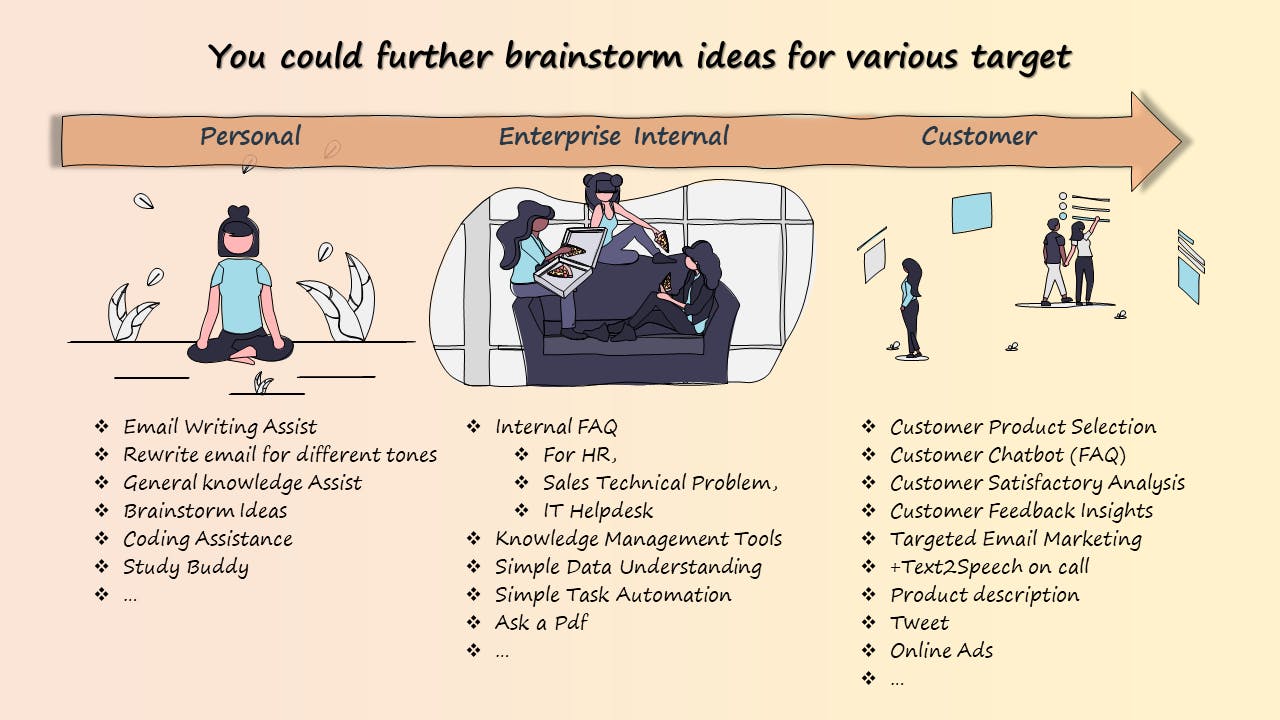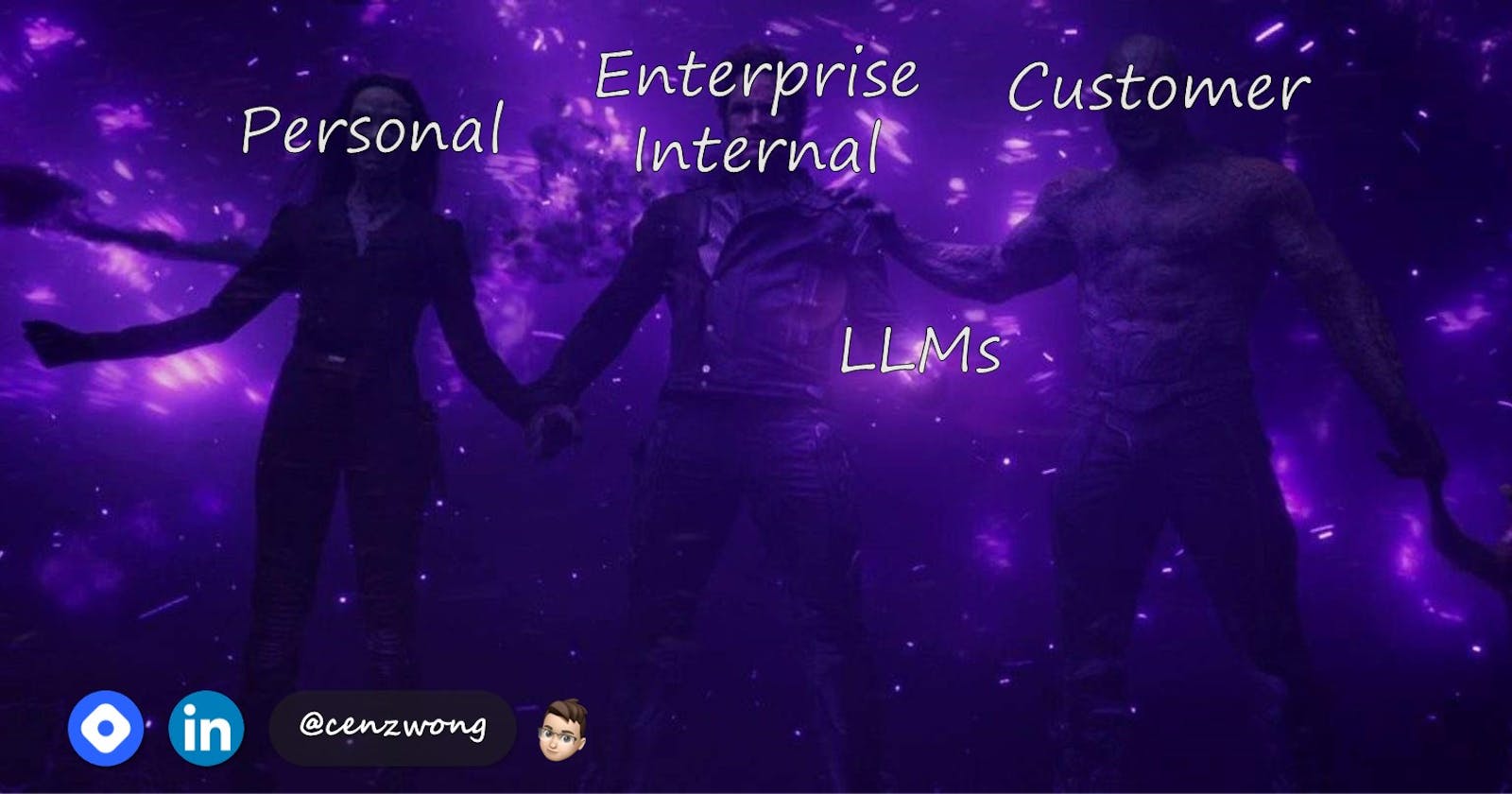The Versatility of Language Models: Personal, Business, and Customer Applications
Table of contents
In today's fast-paced world, we are constantly looking for ways to streamline our workflows and improve our productivity. And with the advent of natural language processing and AI, we now have access to powerful tools that can help us achieve these goals. Large language models (LLMs) like the GPT-3.5 architecture have revolutionized the way we interact with language, opening up new possibilities for businesses and individuals alike.
In this blog, we will explore the various use cases of LLMs, including personal use cases, enterprise internal use cases, and enterprise external use cases for customers. By understanding the unique needs and objectives of each target group, we can better tailor the use cases of LLMs to meet their specific requirements and unlock their full potential. From email writing assistants and data analysis tools to customer chatbots and targeted email marketing campaigns, LLMs have a wide range of applications that can help us save time, improve efficiency, and enhance customer satisfaction.
With continued advances in natural language processing and AI, we are likely to see even more innovative use cases for LLMs emerge in the years ahead. So, let's dive in and discover the limitless potential of LLMs!

Personal Use Cases
Email Writing Assist 📧💬🤖: One of the most common use cases for LLMs is as an email writing assistant. With the help of an LLM, you can quickly generate clear, concise, and grammatically correct emails that convey your message effectively. This can save you time and effort, especially if you're sending a lot of emails each day.
Rewrite Email for Different Tones 😊😡🤔: LLMs can also be used to rewrite emails for different tones. For example, if you need to send a follow-up email that's more assertive or persuasive than your initial message, an LLM can help you craft the perfect tone and language.
General Knowledge Assist 🧠📚🤖: LLMs are also useful as general knowledge assistants. Whether you want to know the weather forecast, check the latest news, or learn more about a particular topic, an LLM can help you find the information you need quickly and easily. (Only with internet-connected LLMs: Bing / ChatGPT with Plugin)
Brainstorm Ideas 💡🤔🤖: LLMs can also be used to brainstorm ideas for creative projects. Whether you're writing a novel, designing a website, or planning a marketing campaign, an LLM can help you generate new ideas and explore different approaches.
Coding Assistance 💻🤖: Finally, LLMs can be used to assist with coding tasks. For example, an LLM can generate code snippets or suggest ways to optimize your code for better performance.
Enterprise/Internal Use Cases:
Internal FAQ 📝🤖: LLMs can be used to generate internal FAQ pages for employees, which can help reduce the workload of HR and IT departments.
HR 👥🤖: LLMs can assist with HR tasks, such as generating job descriptions, analyzing resumes, and even conducting initial candidate interviews.
Sales Technical Problem 💻🤖: LLMs can assist sales teams with technical problems by generating solutions and providing technical documentation.
IT Helpdesk 🖥️📞🤖: LLMs can be used to generate responses to common IT helpdesk queries.
Knowledge Management Tools 📚🤖: LLMs can assist with knowledge management by generating training materials and providing insights into how knowledge is being used within an organization.
Simple Data Understanding 📊🤖: LLMs can be used to assist with data analysis tasks by generating summaries and insights.
Simple Task Automation 🤖📅: LLMs can be used to automate simple tasks, such as scheduling meetings or generating reports.
Ask a Pdf 📄🔍🤖: LLMs can be used to extract information from PDF documents, making it easier to search and analyze large volumes of data.
Customer Use Cases:
Customer Product Selection 🛍️🤖: LLMs can be used to assist customers with product selection by generating recommendations based on their preferences and needs.
Customer Chatbot (FAQ) 💬🤖: LLMs can be used to generate responses to common customer queries, freeing up customer service representatives to focus on more complex issues.
Customer Satisfactory Analysis 😊📈🤖: LLMs can be used to analyze customer feedback and generate insights into how to improve customer satisfaction.
Targeted Email Marketing 📧🎯🤖: LLMs can be used to generate targeted email marketing campaigns that are personalized to each customer's interests and preferences.
Text2Speech on Call 📞🤖🔊: LLMs can be used to provide text-to-speech capabilities for customer service calls, making it easier for customers to get the help they need.
Product Description 📝🤖: LLMs can be used to generate product descriptions that are optimized for search engine rankings and customer engagement.
Tweet 🐦🤖: LLMs can be used to generate tweets that are optimized for engagement and reach.
Online Ads 🖥️🤖🎯: LLMs can be used to generate online ads that are targeted to specific demographics and interests.
In conclusion, LLMs have a wide range of use cases across different target groups. Whether you're looking to save time and effort in your personal life, improve business outcomes in an enterprise setting, or provide better customer service, LLMs can be an incredibly useful tool. With continued advances in natural language processing and AI, we're likely to see even more innovative use cases for LLMs emerge in the years ahead. 🚀🤖💡
Check out the MindMap here. 🤔 Do you have other ideas or use cases? Share them in the comments below or send me a message on LinkedIn! 📩


